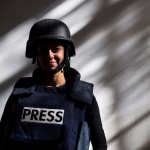Flesh and blood
Baadre, Iraq -- Her dark hair was pulled back by a white scrunchie and she had chipped pink polish on her nails. Like any teenager, I thought. Except the words she spoke were as far from a carefree teenagedom as you could get.
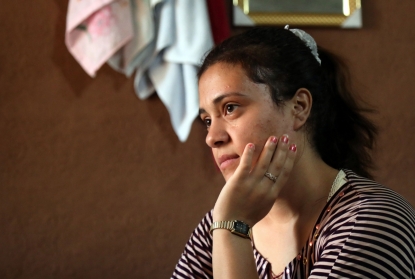 Iraq's Yazidi Jihan Qassem, 18, pauses as she talks to a AFP reporter at a makeshift house in an area housing many displaced people on the outskirts of the northwestern Iraqi town of Baadre on June 25, 2019. (AFP / Safin Hamed)
Iraq's Yazidi Jihan Qassem, 18, pauses as she talks to a AFP reporter at a makeshift house in an area housing many displaced people on the outskirts of the northwestern Iraqi town of Baadre on June 25, 2019. (AFP / Safin Hamed)Jihan, an 18-year-old Yazidi survivor of five years of Islamic State group captivity, lived through more than anyone should, let alone as a child.
At 13, she was seized by IS from her village in Iraq's Sinjar, the rugged ancestral homeland of the Yazidi minority, and separated from her family.
By 15, she had been forced to marry a Tunisian IS member. "I told him I wanted birth control, but he said he wanted children," she told me, without flinching.
So, by 17, she was a mother of two, shuffled by her jihadist captors from city to city as their so-called "caliphate" shrunk under US-backed pressure.
She gave birth to her third child in Baghouz, the Syrian farming hamlet where IS made its last stand earlier this year. She was finally rescued by US-backed forces in March, and taken with her children to a safehouse hosting other Yazidi survivors.
And by 18, she faced another trial, a choice no number of years could ever prepare a mother for. She could stay with her children, but remain ostracised from the insular Yazidi community, who would not accept children born of non-Yazidi fathers. Or she could leave the children in Syria and come home.
She agonized for a week and eventually chose the community she was born into, coming home to her older brother and his family in northwest Iraq, where we met her for an interview last month.
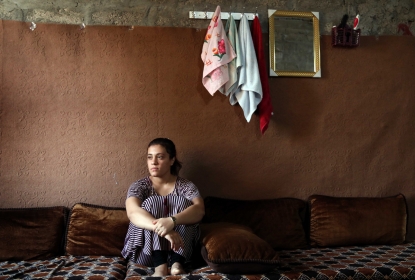 Iraq's Yazidi Jihan Qassem, 18, pauses as she talks to a AFP reporter at a makeshift house in an area housing many displaced people on the outskirts of the northwestern Iraqi town of Baadre on June 25, 2019. - (AFP / Safin Hamed)
Iraq's Yazidi Jihan Qassem, 18, pauses as she talks to a AFP reporter at a makeshift house in an area housing many displaced people on the outskirts of the northwestern Iraqi town of Baadre on June 25, 2019. - (AFP / Safin Hamed)It was my first time interviewing a survivor of sexual assault on camera, and with a multimedia team that was majority-male. So we took our time, chatting with Jihan and her relatives over tea so they could get comfortable with us. When it came time to film, I fastened her neck mic slowly and deliberately.
Jihan spoke without stuttering, sharing the darkest moments of her captivity with a candidness that was both impressive and heart-shattering. She said she didn't regret leaving her kids behind -- "Daesh children," she called them -- but her eyes shimmered and mouth turned up in a smile when she spoke of them. She said she left them behind at a Yazidi-run shelter in northeast Syria, which told her they’d be raised in an orphanage. And she insisted that she no longer thinks about them. “Why would I want to see them again? Let them stay there, so they can forget me and I can forget them. Let them live their life and grow up,” she said, almost mechanically.
I wondered if, in some ways, her age made it easier to ignore the tangled feelings circling around her enforced motherhood. I tried to remember myself at 18, and concluded without a doubt I would have been nowhere near as brave as the quiet girl across from me.
"Do you think you'll get married again?" I asked. I expected a hard "no," a shunning of the establishment that had complicated her life at such an early age. Again, she surprised me.
"I'll see how my life turns out. I might study. I'm still young -- I was 13 when it happened," she replied.
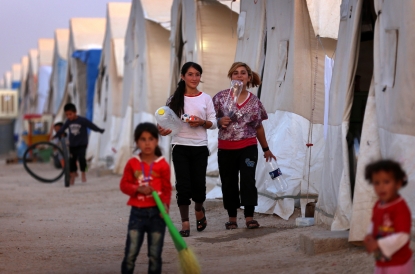 Displaced Iraqis from the Yazidi community, who fled violence between Islamic State (IS) group jihadists and Peshmerga fighters in the northern Iraqi town of Sinjar, are seen at a camp for internally displaced persons (IDP) in the Sharya area some 15 kilometres from the northern Iraqi city of Dohuk on May 20, 2015. (AFP / Safin Hamed)
Displaced Iraqis from the Yazidi community, who fled violence between Islamic State (IS) group jihadists and Peshmerga fighters in the northern Iraqi town of Sinjar, are seen at a camp for internally displaced persons (IDP) in the Sharya area some 15 kilometres from the northern Iraqi city of Dohuk on May 20, 2015. (AFP / Safin Hamed)Our team spent a little under a week in Iraq's northwestern province of Dohuk, interviewing Yazidi women and children who were held captive by IS, as well as their families, activists, social workers and clerics. Yazidis had been flushed out of their ancestral villages by jihadists in 2014, and were eking out a living in dozens of camps and informal settlements scattered across Dohuk's rolling hills. There, in each UN-provided tent, in every one-room cement shack a family now called home, were seemingly endless stomach-turning stories of loss, distrust and shame.
For five years, those stories were examined under international floodlights, told in newspaper articles and documentaries and special reports. Our aim was to produce a series of sensitive, original stories from a broken and media-weary community, without fetishising them or reopening their wounds.
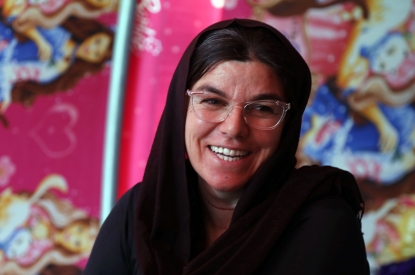 Iraq's Yazidi survivor Layleh Shemmo smiles at her tent in the Khonke camp for displaced persons in northwestern Iraq on June 24, 2019. (AFP / Safin Hamed)
Iraq's Yazidi survivor Layleh Shemmo smiles at her tent in the Khonke camp for displaced persons in northwestern Iraq on June 24, 2019. (AFP / Safin Hamed)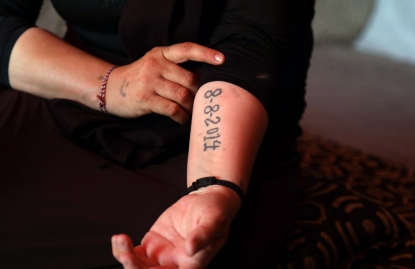 Iraq's Yazidi survivor Layleh Shemmo displays her tatoo bearing the date fighters from the Islamic State group entered the village of Sinjar, at her tent in the Khonke camp for displaced persons in northwestern Iraq on June 24, 2019. (AFP / Safin Hamed)
Iraq's Yazidi survivor Layleh Shemmo displays her tatoo bearing the date fighters from the Islamic State group entered the village of Sinjar, at her tent in the Khonke camp for displaced persons in northwestern Iraq on June 24, 2019. (AFP / Safin Hamed)
Jihan's family was a microcosm of all the stories you'll find in the shattered Yazidi community. There was her own time in jihadist captivity, her gut-wrenching decision to leave her children behind; there were her parents, separated from their children since they were resettled abroad like roughly 100,000 other Yazidis since 2014; there was her brother Saman, the surviving male of the family trying to provide for his own children while carrying on the search for missing relatives; and there were her sister and two brothers -- kidnapped by IS and still missing, their absences like three holes burned into a family picture.
Jihan's three tiny children, fathered by a member of the same jihadist group who kidnapped her missing siblings, would never be able to fill those gaps, said Saman. "How could I accept them coming here? How?" he said.
Other children had returned, scrawny Yazidi kids kidnapped by IS in 2014 and who had spent half their lives being raised by jihadists.
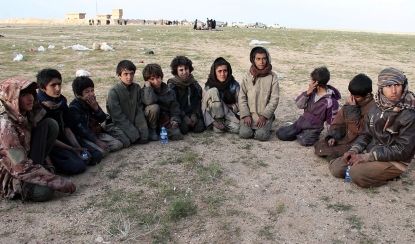 Saddam, (R) a 15 year old Yazidi boy and ten other Yazidi children gather in a area held by the US-backed Kurdish-led Syrian Democratic Forces (SDF), in the eastern Syrian province of Deir Ezzor, after fleeing the Islamic State (IS) group's embattled holdout of Baghouz, on February 23, 2019. The eleven Yazidi children were rescued by US-backed forces from IS's last sliver of territory in the village of Baghouz near the Iraqi border. (AFP / -)
Saddam, (R) a 15 year old Yazidi boy and ten other Yazidi children gather in a area held by the US-backed Kurdish-led Syrian Democratic Forces (SDF), in the eastern Syrian province of Deir Ezzor, after fleeing the Islamic State (IS) group's embattled holdout of Baghouz, on February 23, 2019. The eleven Yazidi children were rescued by US-backed forces from IS's last sliver of territory in the village of Baghouz near the Iraqi border. (AFP / -)On my last day in Dohuk, I spent a few hours with an extended family whose five children, all between seven and 12 years old, had been rescued from IS at various points over the last three years. It makes me uncomfortable to admit the visible difference between those rescued in 2016, and those freed from Baghouz just a few months ago. A brother and sister who had escaped IS in 2016 with their mother bounced around the tent in brightly-coloured clothes, speaking Kurdish. Their three cousins, home just a few months ago, sat in a corner playing a video shooting game and speaking to each other in Arabic. I asked their mother if speaking to them in my native Arabic, which they had learned under IS, would traumatise them. She shrugged.
I offered my notebook to one of the recent returnees, 10-year-old Lama, and she painstakingly etched out a few letters.
"What's that?" I asked.
"I used to have a different name. The name my other family called me," she said.
I asked if she had nightmares. She looked at me blankly.
As I watched them, I wondered how these children would grow up to think about the ideas of home, religion and family. Would they eventually abandon Arabic, too tied to their experience of captivity? Would they be able to open up about what they went through to a community so violently blown apart by the people who raised them for the past five years? The questions were too big to ask of victims so small. And I was afraid it would just re-traumatize them all over again.
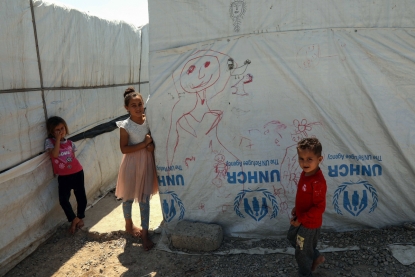 Displaced Iraqi Yazidi children stand next to a tent at a camp in Khanke, a few kilometres from the Turkish border in Iraq's Dohuk province, on June 24, 2019. (AFP / Safin Hamed)
Displaced Iraqi Yazidi children stand next to a tent at a camp in Khanke, a few kilometres from the Turkish border in Iraq's Dohuk province, on June 24, 2019. (AFP / Safin Hamed)Those children, born of two Yazidi parents, were forgiven when it came to the community. But those born of rape to Yazidi mothers weren’t. It was like the Yazidi part of them didn’t exist. Just the Daesh part. In so many conversations, interviewees seemed to imply that the non-Yazidi blood in these children made them predisposed to violence and extremism. “You think this child will grow up to be normal?” one activist asked me.
It was hard to listen to people talk about children that way. I thought people who were themselves victims of such unimaginable cruelty would have more empathy for children who didn’t choose to be born of rape.
"If you and I say those kids should be allowed to come back, we have one reason -- a sense of humanity. But those who say they shouldn't have a thousand reasons," the same Yazidi activist said. "If a kid is born to a jihadist father, how are we supposed to get him an ID? What will we register as the name of his father? Abu Bakr al-Baghdadi?" He laughed, referring to the head of IS.
Another woman, a government social worker, said children who had lived under IS remained vulnerable to extremism. "Children are like an empty weapon. You can load them with whatever ammunition you want," she said flatly.
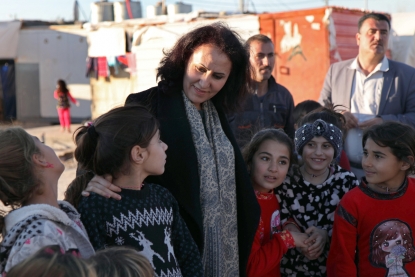 Female Yazidi gynaecologist Nagham Hasan (C), aged 41, embraces children as she provides psychosocial support to Yazidi refugees at the Kabarto camp for internally displaced persons (IDP), some fifteen kilometres northwest from the Iraqi city of Dohuk on February 3, 2019. (AFP / Safin Hamed)
Female Yazidi gynaecologist Nagham Hasan (C), aged 41, embraces children as she provides psychosocial support to Yazidi refugees at the Kabarto camp for internally displaced persons (IDP), some fifteen kilometres northwest from the Iraqi city of Dohuk on February 3, 2019. (AFP / Safin Hamed)And Dr. Nagham Hasan, a Yazidi obstetrician and gynaecologist who has tirelessly advocated for her community, said bringing home children born of jihadists would just be one step too far for the brutalised minority. "These are the children of our enemies," she told me softly.
I first met Hasan in late January, when we covered her work as a de facto therapist for hundreds of Yazidi survivors who had no one else to turn to. My colleagues and I shadowed her as she floated from tent to tent to check in on her young Yazidi patients, diagnosing their physical wounds and taking on their emotional ones. This time, we met over coffee at a mall in Dohuk. The circles under her eyes had gotten even darker.
"Everyone is exhausted. We're tired, tired of talking about the same problems, tired of seeing nothing improve," she said.
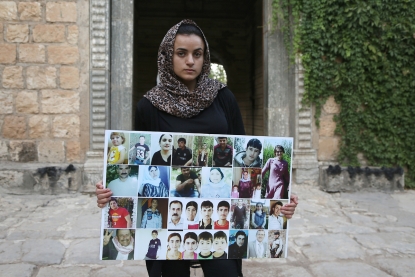 Yazidi woman Ashwaq Haji, allegedly used by the Islamic State group (IS) as a sex slave, holds portraits of jihadists' victims from her village of Kocho near Sinjar, as she visits the Lalish temple, in Lalish, northern Iraq, on August 15, 2018. - A young Yazidi woman who fled to Germany but returned home to northern Iraq says she cannot escape her Islamic State group captor who held her as a sex slave for three months.
Ashwaq Haji, 19, says she ran into the man in a German supermarket in February. Traumatised by the encounter, she returned to Iraq the next month. Like many other Yazidis, she was kidnapped by IS when the jihadists seized swathes of Iraq in the summer of 2014. (AFP / -)
Yazidi woman Ashwaq Haji, allegedly used by the Islamic State group (IS) as a sex slave, holds portraits of jihadists' victims from her village of Kocho near Sinjar, as she visits the Lalish temple, in Lalish, northern Iraq, on August 15, 2018. - A young Yazidi woman who fled to Germany but returned home to northern Iraq says she cannot escape her Islamic State group captor who held her as a sex slave for three months.
Ashwaq Haji, 19, says she ran into the man in a German supermarket in February. Traumatised by the encounter, she returned to Iraq the next month. Like many other Yazidis, she was kidnapped by IS when the jihadists seized swathes of Iraq in the summer of 2014. (AFP / -)In many conversations that week, I had heard from Yazidis how worn down they were by their community's indefinite displacement and the unsolved mystery of their missing relatives. Much of Sinjar still lay in ruins and only a few thousand Yazidis had returned. "If there's no Sinjar, there are no Yazidis," said Ali Kheder of the Higher Spiritual Council.
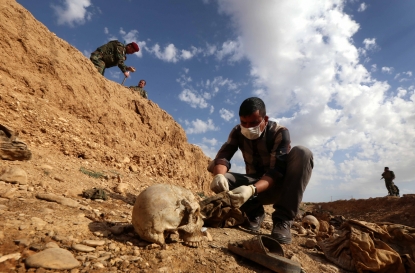 An Iraqi man inspects on February 3, 2015, the remains of members of the Yazidi minority killed by the Islamic State (IS) jihadist group after Kurdish forces discovered a mass grave near the village of Sinuni, in the northwestern Sinjar area. (AFP / Safin Hamed)
An Iraqi man inspects on February 3, 2015, the remains of members of the Yazidi minority killed by the Islamic State (IS) jihadist group after Kurdish forces discovered a mass grave near the village of Sinuni, in the northwestern Sinjar area. (AFP / Safin Hamed)For many, the weariness had turned to frustration -- a boiling anger at local and federal officials, at the international community, and even at reporters. In their view, the community had opened up about the sickening, humiliating atrocities of IS for five years, hoping global awareness could translate into real help. In the context of this disappointment, asking about the reintegration of IS-born children was like throwing salt on wounds that were very much still open.
Baba Shawish, a Yazidi cleric and custodian of the sect's holiest site of Lalish, flat out refused to discuss the women survivors or their children.
"These are just a few cases when we have thousands of girls still missing. So in your eyes, one of these children is worth 1,000 Yazidi girls?" he asked me, bile in his words.
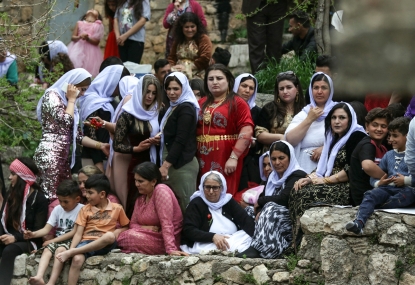 Iraqi Yazidi women gather outside the Temple of Lalish, in a valley near the Kurdish city of Dohuk about 430 kilometres northwest of the capital Baghdad, on April 16, 2019, during a ceremony marking the Yazidi New Year. - (AFP / Safin Hamed)
Iraqi Yazidi women gather outside the Temple of Lalish, in a valley near the Kurdish city of Dohuk about 430 kilometres northwest of the capital Baghdad, on April 16, 2019, during a ceremony marking the Yazidi New Year. - (AFP / Safin Hamed)It was often hard to get interviewees to move past that bitterness and open up, precisely because they already had, without seeing much progress. That's where Suzan came in.
Suzan, a social worker with the Jinda Foundation and Iraq manager for Sikh NGO Khalsa Aid, is the closest thing I've seen to an angel on earth. She is a fierce ally of Dohuk's Yazidi community, a compassionate listener and a resourceful, creative point person for Yazidi families based in camps around Dohuk. When Suzan wades into a cluster of tents in a refugee camp, she is immediately swarmed by bouncing children, mothers whose newborn babies she helped name, teenage Yazidi girls who wait for her to visit the camp to request hygienic supplies or ask other questions they'd be too shy to pose to anyone else.
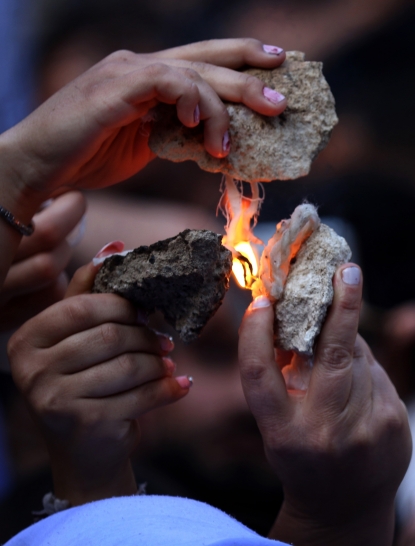 Iraqi Yazidis light candles and paraffin torches outside Lalish temple situated in a valley near Dohuk, 430 km (260 miles) northwest of Baghdad, during a ceremony to celebrate the Yazidi New Year on April 17, 2018. - (AFP / Safin Hamed)
Iraqi Yazidis light candles and paraffin torches outside Lalish temple situated in a valley near Dohuk, 430 km (260 miles) northwest of Baghdad, during a ceremony to celebrate the Yazidi New Year on April 17, 2018. - (AFP / Safin Hamed)Suzan was indispensable helping to find many of the vulnerable women and children we interviewed for this package, and helping them feel comfortable around us. Advocates like her are crucial intermediaries for sensitive stories like this one, and Suzan was a steady ray of sunshine bringing light, and warmth, to gloomy stories.
There was another silver lining: the opportunity to produce stories almost entirely about women. After remotely covering Syria for over three years, and eight months into my posting in Iraq, I had become accustomed to male-driven, male-centered stories. Rebel commanders, government officials, experts and academics, activists and aid workers -- an overwhelming majority of our sources are men.
One tiny kernel of good that has emerged from the horrifying subjugation of the Yazidis in 2014 is the empowerment of the community's female voices. Nobel Peace Laureate Nadia Murad may be the most prominent example, but there are thousands of brave souls like her across Dohuk. Navin Dinnay, a young Yazidi journalist who arrived home from northeast Syria just a few weeks prior after five years under IS, was visibly impatient when we met her. "I want to start speaking. I have so much to say, and there's so much work to be done," Dinnay told us. Her courage and that of others gave me the rare chance to write stories almost entirely about women: survivors, aid workers, journalists, doctors, analysts and government officials, telling their own stories for once.
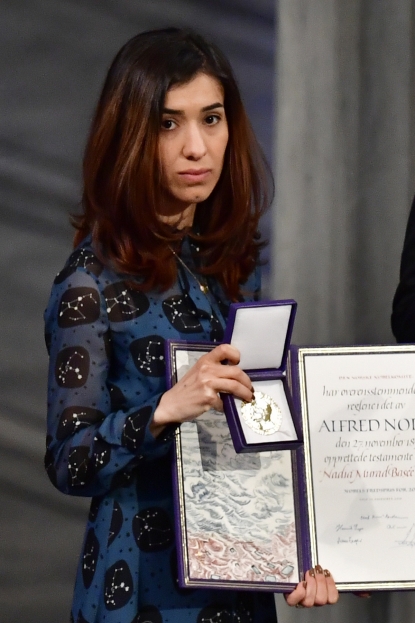 Iraqi Yazidi-Kurdish human rights activist and co-laureate of the 2018 Nobel Peace Prize Nadia Murad poses with her Nobel Peace Prize during the award ceremony 2018 on December 10, 2018 at the City Hall in Oslo, Norway. (AFP / Tobias Schwarz)
Iraqi Yazidi-Kurdish human rights activist and co-laureate of the 2018 Nobel Peace Prize Nadia Murad poses with her Nobel Peace Prize during the award ceremony 2018 on December 10, 2018 at the City Hall in Oslo, Norway. (AFP / Tobias Schwarz)It has been nearly five years since IS's rampage against Sinjar, but if the Yazidi community agrees on one thing, it's that the horrible saga that began that year has not ended. "The genocide is ongoing," interviewees said repeatedly.
How could it end, they said, with so many people missing, others psychologically broken, and ancestral villages in ruins? How could it end while Yazidis felt Iraq's larger communities had betrayed them in Sinjar a half-decade ago, and may do so again? How could it end when nearly a quarter of the sect's pre-war numbers had already resettled abroad? IS did much more to break the Yazidis than the horrors of enslavement and mass murder. It forcefully pried open an insular minority, ripped them away from their physical roots in Sinjar, and planted a paranoia that after several thousand years in Iraq, they could no longer safely call this country home.
"We need guarantees that won't happen again. So far, we haven't gotten those guarantees," Dr. Nagham said.
"Everyone is talking about leaving. Leaving is genocide, but staying would be too."
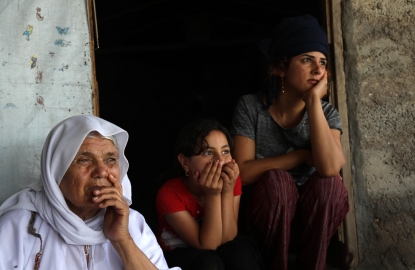 Displaced Iraqi Yazidi women sit outside a tent at a camp in Khanke, a few kilometres from the Turkish border in Iraq's Dohuk province, on June 24, 2019. (AFP / Safin Hamed)
Displaced Iraqi Yazidi women sit outside a tent at a camp in Khanke, a few kilometres from the Turkish border in Iraq's Dohuk province, on June 24, 2019. (AFP / Safin Hamed)


